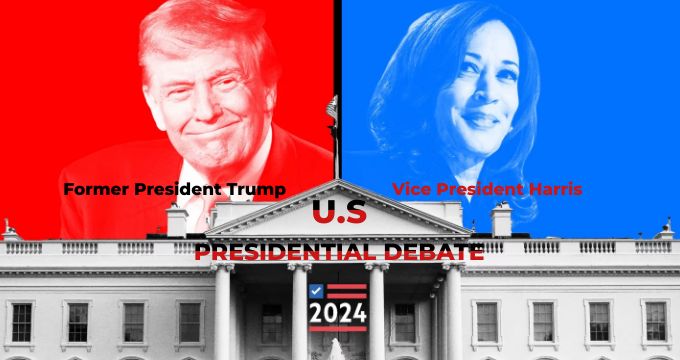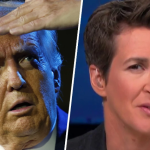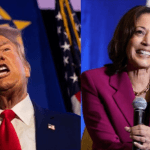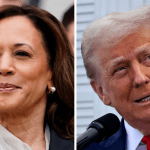Debate between Vice President Harris and former President Trump, covering critical issues like the economy, cost of living, and broader societal concerns.
1. Economic Policies and Middle-Class Support
Kamala Harris on Lifting the Middle Class:
- Harris emphasizes her plan to lift the middle class, mentioning her background and understanding of middle-class struggles.
- Discuss her proposed $6,000 child tax credit to help young families afford essentials.
- Harris’s support for small businesses, including a $50,000 tax deduction to encourage startups.
Trump’s Response to Economic Claims:
- Trump refutes Harris’s claim of imposing a “Trump sales tax” and argues his approach focuses on tariffs to balance international trade.
- He defends his handling of the economy during his term, citing strong tariffs on China and minimal inflation under his watch.
2. Tackling Inflation and Cost of Living
Harris’s View on Economic Recovery:
- Harris critiques Trump’s economic legacy, mentioning the worst unemployment since the Great Depression.
- She aims to continue supporting American families and address the high cost of housing and goods.
Trump’s Defense on Inflation:
- Trump highlights the current inflation crisis, calling it the “worst in our nation’s history.”
- He contrasts this with the economic stability during his presidency, where inflation remained low, and the economy thrived post-pandemic.
3. Immigration and Border Security
Trump’s Take on Immigration:
- Trump blames the current administration for the influx of criminals and mentally unstable individuals, whom he claims are taking over jobs and towns across the U.S.
- He promises stricter border control if re-elected, citing the impact on African-American and Hispanic communities.
Harris’s Response on Immigration:
- Harris acknowledges Trump’s fearmongering tactics but shifts focus to building a united America, pledging to be a president for all.
- She argues that the current administration is cleaning up Trump’s mess, especially regarding the economy and public health.
4. Project 2025: The Debate Continues
Harris on Project 2025:
- Harris raises concerns about “Project 2025,” calling it a dangerous plan that Trump would implement if re-elected.
- She frames it as a continuation of Trump’s divisive policies.
Trump’s Disavowal of Project 2025:
- Trump distances himself from the project, claiming he hasn’t read it and has no involvement.
- He reiterates his commitment to cutting taxes and boosting the economy, dismissing Harris’s accusations as typical political rhetoric.
Economic Plans: A Stark Contrast
Kamala Harris wasted no time in critiquing Donald Trump’s economic plan, stating it benefits only the richest Americans with tax breaks. She emphasized her vision of an “opportunity economy” and cited reviews from top economists, including Goldman Sachs, which claimed Trump’s plan would worsen the economy. Nobel laureates agreed, warning that his approach could invite a recession by next year. In contrast, Harris argued her plan would strengthen the economy and tackle inflation.
Trump, however, brushed off Harris’ criticism, boasting about his own economic plan. He referenced the Wharton School of Finance, saying that top professors endorse his approach. Trump claimed his policies would boost jobs, increase wages, and restore economic growth. According to him, Harris doesn’t have a plan, accusing her of merely copying Biden’s.
The Tariff Debate
Tariffs became a key topic, with Trump defending his policy of imposing up to 20% tariffs on foreign imports. Harris argued that this would lead to higher prices for American families, particularly for essential goods like gas and food. She projected that the average family could see an additional $4,000 in expenses annually.
Trump dismissed the notion that tariffs would hurt Americans, claiming the burden falls on countries like China, which he said had been exploiting the U.S. for years. He boasted about the billions of dollars collected through these tariffs under his administration, saying they were key to keeping inflation low. He blamed the current administration for the soaring inflation and a faltering economy.
Trade Wars and Deficits
Harris turned the discussion toward trade deficits, accusing Trump of worsening America’s position. She criticized his trade wars, especially with China, and pointed out that under his leadership, the U.S. ended up selling critical technology to China. She contrasted this with her focus on strengthening U.S. alliances and investing in cutting-edge technology like AI and quantum computing to ensure America remains competitive.
Trump, unfazed, shot back that the U.S. no longer produces critical components like chips because of policies from Harris’ side. He continued to paint her as a Marxist, claiming that her and her father’s ideologies were harmful to the U.S. economy.
Immigration and Its Impact on the Economy
Immigration became a flashpoint as well, with Trump arguing that millions of undocumented immigrants are harming the U.S. economy. He suggested that the influx of people is out of control, and many are criminals, which, in his view, has disastrous economic consequences.
Harris didn’t shy away from defending her stance on immigration. She argued that comprehensive reform, focused on workers’ rights and fair labor practices, is essential for the U.S. to maintain a strong economy. She rejected the fear-based narrative that immigrants are a threat to the economy.
Abortion: Trust and Consistency
Abortion emerged as a major issue, with Trump frequently shifting his position on the topic. His support for Florida’s six-week abortion ban after initially opposing it left many questioning his consistency. Harris highlighted this, urging voters not to trust Trump on reproductive rights, accusing him of flip-flopping based on political convenience.
Trump reiterated his pride in being the “most pro-life president” and celebrated his role in overturning Roe v. Wade. However, his shifts in position have left some wondering where he truly stands on the issue.
1. Trump’s View on Abortion and the Overturning of Roe v. Wade
Trump begins by defending the Supreme Court’s decision to overturn Roe v. Wade, claiming it returned the power to individual states to decide on abortion legislation. He asserts that this has been a long-standing issue in the country, and praises the six justices for their courage.
- Abortion in the Ninth Month: Trump references extreme claims, stating Democrats support abortion even in the ninth month, and goes further by accusing them of endorsing post-birth “executions.”
- Exceptions to Abortion: He emphasizes his support for exceptions in cases of rape, incest, and the life of the mother, aligning with what he says is the majority Republican stance.
2. Harris’s Response to Trump’s Claims
Harris pushes back against Trump’s remarks, calling them lies and highlighting the impact of abortion bans implemented in several states.
- Abortion Bans in Multiple States: Harris critiques the so-called “Trump abortion bans,” which, in her view, strip women of their rights, including in cases of rape and incest. She emphasizes the moral and ethical issues of forcing survivors to carry pregnancies to term.
- Miscarriages and Healthcare Denial: Harris shares personal stories of women suffering from miscarriages who are denied proper care due to fear of legal repercussions for healthcare providers.
3. The States vs. Federal Government Debate on Abortion
Trump continues to defend the decision to let states handle abortion laws, claiming that it is now up to voters to decide how abortion should be regulated, which he views as a significant win for democracy.
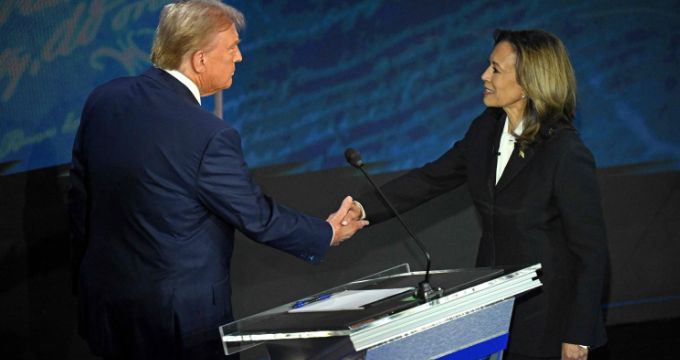
- The State’s Role: Trump stresses that the shift from federal control to state-level decision-making on abortion is what everyone, including Democrats and Republicans, has wanted for decades.
- No Need for a National Ban: He dismisses Harris’s concerns about a national abortion ban, stating it won’t happen because Congress would never pass such legislation.
4. Harris’s Pledge to Reinstate Roe v. Wade Protections
Harris counters by pledging to reinstate the protections of Roe v. Wade if elected president, vowing to sign it into law once Congress passes the necessary bill.
- National Abortion Ban Concerns: She warns of Trump’s potential to impose a national abortion ban and mentions “Project 2025,” which she claims would monitor pregnancies and miscarriages across the nation.
- IVF and Healthcare: Harris also addresses concerns regarding reproductive healthcare, particularly the challenges working women face in accessing care, as well as how couples seeking IVF treatments are being denied options.
5. Trump’s Rebuttal on Healthcare and Abortion
Trump disputes Harris’s claims, particularly on IVF and abortion. He reiterates his support for IVF and denies any intent to ban or restrict it.
- IVF Leadership: Trump highlights his leadership on supporting IVF, referencing legislative actions in Alabama that back IVF treatments.
- Abortion in Late Pregnancy: He presses Harris to clarify her stance on late-term abortions, emphasizing his opposition to any abortion in the later stages of pregnancy.
1. Trump’s Immigration Proposal: Deporting Millions
President Trump outlines his plan to deport 11 million undocumented immigrants, claiming the number is likely much higher. He advocates for using the National Guard, local police, and even the U.S. military if necessary.
- Crime and Terrorism Concerns: Trump argues that millions of criminals, including terrorists and drug dealers, have entered the U.S., claiming countries like Venezuela are sending their worst criminals.
- Impact on the U.S.: He states that while crime is decreasing globally, it is rising in the U.S. due to what he calls “migrant crime.”
2. FBI Crime Statistics Dispute
When challenged with FBI data showing a decline in violent crime, Trump dismisses it, labeling the statistics fraudulent. He asserts that the worst cities were excluded from the report, undermining its credibility.
3. Harris’s Criticism of Trump’s Legal Troubles
Vice President Harris criticizes Trump for his legal issues, highlighting his criminal charges and focusing on the rule of law. She contrasts his legal battles with her own plans for the nation’s future.
- Economic and Legal Contrast: Harris points out Trump’s legal troubles, such as economic crimes and election interference, emphasizing the need for leadership focused on real issues like affordable housing and supporting small businesses.
4. Trump’s Defense Against Legal Weaponization
Trump defends himself, claiming that the Justice Department has been weaponized against him. He argues that the cases brought against him were politically motivated, designed to influence the election.
5. Harris’s Response: Warning About Trump’s Potential Return
Harris responds by warning of the consequences if Trump returns to power, suggesting he would further weaponize the Justice Department. She highlights his alleged desire to terminate the Constitution and shows concern for what this could mean for democracy.
6. Policy Shifts and Harris’s Record
The debate shifts to Harris’s changing stance on key policies. In her previous presidential run, she called for banning fracking and decriminalizing border crossings, but her positions have since evolved.
- Fracking and Energy Policy: Harris defends her record on fracking, emphasizing her work on the Inflation Reduction Act, which opened new leases for fracking. She argues for investment in diverse energy sources to reduce reliance on foreign oil.
- Values and Experience: Harris shares personal anecdotes, connecting her policy positions to her values shaped by her upbringing and experiences.
7. Trump’s Response: Defending His Record
Trump disputes Harris’s claims, particularly about fracking and her past support for defunding the police. He asserts that her policy reversals undermine her credibility.
- Fracking and Economic Success: Trump downplays Harris’s criticism of his financial history, defending his business successes and stating that he built his fortune from a much smaller inheritance.
Criminal Justice and Controversial Policies
Kamala Harris has faced criticism for her actions during the unrest in Minnesota. Allegations that she raised money to help individuals involved in violent protests in Minneapolis get out of jail have stirred controversy. Critics argue that her approach supports criminal behavior, but her supporters claim it was an effort to ensure fairness in the criminal justice system.
Adding to this, Harris’ position on transgender rights, particularly her support for providing transgender healthcare, including operations, for undocumented immigrants in prison, has sparked debates. Opponents frame this as a radical policy, while advocates argue it’s part of a broader human rights issue.
Gun Control and Environmental Policies
On the topic of gun control, Harris has taken a strong stance, supporting measures that restrict gun access, which her detractors say threatens Second Amendment rights. Critics like Donald Trump claim that she wants to confiscate guns, though her campaign maintains that it is focused on responsible gun ownership.
Additionally, Harris’ environmental policies, particularly her stance on fracking, have become a major point of contention in states like Pennsylvania. Trump has repeatedly claimed that a Harris administration would ban fracking, which he says would lead to economic decline in energy-dependent regions. Harris, on the other hand, supports transitioning away from fossil fuels toward renewable energy sources but denies immediate bans that could harm jobs.
Energy and Economic Concerns
Trump often touts his efforts to boost the oil industry, arguing that under his administration, the U.S. achieved energy independence. He criticizes Harris’ approach to energy, claiming that her policies would return the U.S. to relying on wind and solar energy, which he views as inefficient. He points out that solar energy, for instance, requires large tracts of land, something he believes is detrimental to the environment and impractical for energy production.
In his view, if Harris were to win, the fossil fuel industry would be decimated on day one, leading to skyrocketing energy prices and a weakened economy.
Immigration and National Security
Immigration is another key battleground. Trump has frequently criticized Harris for her handling of border security during her time as Vice President. He argues that her leniency on immigration has allowed criminals to enter the U.S. unchecked, leading to a rise in crime. He also claims that Harris has not done enough to secure the border and reduce illegal immigration, though her supporters counter that her focus has been on comprehensive reform and humane treatment of migrants.
January 6th and Leadership Accountability
The events of January 6th, 2021, remain a focal point of criticism for both candidates. Trump continues to defend his actions, stating that he encouraged peaceful demonstrations and that security failures on that day were the responsibility of then-Speaker Nancy Pelosi and Washington, D.C.’s mayor. He also downplays the violence, referring to Ashli Babbitt’s death as a tragic overreach by law enforcement.
Harris, in contrast, views January 6th as an attack on democracy, directly incited by Trump. She frequently references this event, along with others like Charlottesville, to highlight what she sees as a pattern of behavior that undermines American values and threatens the country’s stability.
Trump’s Approach to Negotiating with Netanyahu and Hamas
When asked how he would handle the conflict in Gaza and negotiate with both Israeli Prime Minister Netanyahu and Hamas, Trump made bold claims. He argued that if he were president, the violence and hostage-taking would have never occurred. Trump emphasized his relationship with foreign leaders like Putin, stating that his strong connections would have prevented global conflicts, including the war in Ukraine.
He criticized Vice President Harris for her stance on Israel, claiming that she disrespects the country and its leader by refusing to meet Netanyahu. Trump also warned that under Harris’ leadership, Israel would be destroyed within two years, and he linked this to broader instability in the Middle East, blaming the current administration for Iran’s renewed financial power, which he said fuels terrorism through groups like Hamas and Hezbollah.
Harris’ Defense: Supporting Israel and Strong Foreign Policy
Vice President Harris responded directly to Trump’s accusations, denying any animosity toward Israel. She pointed out her long-standing support for the nation, both in her career and in her personal stance. She criticized Trump for his admiration of dictators and alleged that his past dealings with autocrats like Putin and Kim Jong-un have made the U.S. vulnerable.
Harris also addressed Trump’s claim that dictators favor his return, arguing that his weakness on national security issues made him manipulable. She emphasized the need for a president who prioritizes strong international alliances, especially with the military and foreign leaders.
Trump’s Views on the Ukraine Conflict and Global Leadership
Turning to the war in Ukraine, Trump reiterated his claim that he would end the conflict within 24 hours through negotiation. He questioned whether Ukraine should win the war, instead focusing on ending the fighting as quickly as possible to save lives. He criticized the Biden administration for spending billions on the conflict and failing to push European countries to contribute more to Ukraine’s defense.
Trump emphasized his relationships with both Putin and Zelensky, suggesting that respect for him as a leader would have prevented the war from happening in the first place. He also accused Biden of avoiding direct communication with Russia and failing to take decisive action, which he believes has escalated the conflict.
Harris’ Critique of Trump’s Ukraine Stance
Harris countered Trump’s statements by underscoring the importance of defending Ukraine’s sovereignty and territorial integrity. She recalled her meetings with Zelensky before the invasion and highlighted the significant role of U.S. leadership in rallying 50 countries to support Ukraine’s defense.
Harris framed Trump’s plan to resolve the war as essentially surrendering Ukraine to Russia, contrasting this with the Biden administration’s ongoing support for Ukraine. She reiterated the importance of NATO and maintaining a strong front against authoritarian regimes.
Trump on Afghanistan and NATO Contributions
The conversation shifted to Afghanistan, where Trump defended his role in negotiating with the Taliban. He stated that during his presidency, there were no U.S. military casualties in the final 18 months of his administration due to his direct involvement with Taliban leaders. Trump criticized the Biden administration’s withdrawal from Afghanistan, calling it the most embarrassing moment in U.S. history and linking it to Russia’s invasion of Ukraine.
Trump also took credit for securing increased financial contributions from NATO allies, a move he says was crucial in strengthening the alliance and reducing the U.S.’s financial burden.
2. Race and Identity: A Divisive Discussion
- Trump’s Comments on Harris’ Racial Identity: Explore the moment when President Trump was questioned about his comments on Vice President Harris’ race.
- Harris’ Response: Highlight Vice President Harris’ rebuttal, emphasizing her criticism of Trump’s racial rhetoric and his past actions regarding race.
3. The Trump Legacy on Race
- Trump’s Track Record: Include Harris’ references to Trump’s history with racial issues, such as the Central Park Five, the birther conspiracy, and real estate discrimination.
- Trump’s Defense: Discuss Trump’s defense, where he dismisses the significance of these events and redirects focus to his economic achievements.
4. Plans for the Future: Economic and Healthcare Policies
- Healthcare Debate: Focus on the back-and-forth about Obamacare, Trump’s criticisms of it, and Harris’ defense of the Affordable Care Act.
- Economic Visions: Compare the economic plans each candidate presents, including Trump’s focus on rebuilding the economy and Harris’ small business and family support initiatives.
5. Climate Change: Contrasting Views on the Environment
- Harris on Climate Action: Summarize Harris’ perspective on climate change as an existential threat and her administration’s actions in clean energy and job creation.
- Trump’s Environmental Stance: Outline Trump’s rebuttal, highlighting his skepticism about climate change and his focus on economic impacts.
6. Closing Remarks: Competing Visions for America
- Harris’ Optimistic Vision: Summarize Harris’ closing statement, where she focuses on unity, opportunity, and a hopeful future for the country.
- Trump’s Critique of the Current Administration: End with Trump’s closing remarks, emphasizing his claim that the current administration has failed and his promise to restore the nation’s strength.

